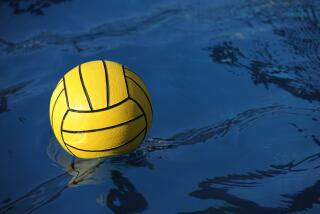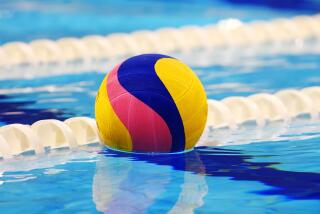Reversing the Tide : 3 National Titles Help Corso Battle Upstream in Pursuit of Olympic Post
- Share via
About two years ago, a newspaper headline proclaimed that Harvard High water polo Coach Rich Corso would “test Olympic waters” by running for the elected job oS. national team head coach.
Corso plunged in. Glub, glub . Not only did he lose the election, but the U. S. Olympic water polo association denied him a staff position on the national team, with which he had served since 1980.
While Corso didn’t really expect to win the election--the incumbent had led the United States to the silver medal in Seoul--he did feel he deserved to stay on the staff based on his success as coach of the U. S. junior national team. So the rebuff angered him and hurt his feelings.
“I had assumed I’d always coach a U. S. national team,” Corso said. “I thought I had a job for life.”
Corso moped around for a few days, even considered quitting Harvard and coaching a club team in Germany. But then he got over it. “I realized I just wasn’t figured into the master plan for that quadrennium,” he said. “So I just went on with my life.”
With his head well above water.
While Corso has not done any active campaigning recently for national team head coach--current Coach Bill Barnett might step down after the ’92 Olympics--he has been content to let his record speak for itself: His Harvard Water Polo Foundation club team has won the past three senior men’s U. S. championships, including last month’s indoor event in Ft. Lauderdale, Fla.
The team, which includes Olympians Terry Schroeder and Craig Wilson, has dominated men’s water polo in this country for the past 1 1/2 years, even winning the UCLA Invitational. Ironically, its formation is the direct result of Corso’s rejection by the national team.
About the same time that happened, Corso was offered an assistant coaching job with European Cup champion Wasserfreunde Spandau 04, and he impulsively considered taking it, almost out of spite. “I was ready to go,” he said. So he went in and talked with Harvard headmaster Tom Hudnut, who advised him to stay put and then asked, “Why not create your own Spandau over here?” Corso recalled.
Hudnut then went about helping Corso develop the nonprofit Harvard Water Polo Foundation, which fields a team that practices at Harvard but has no affiliation with the school. Why to stay? “A number of people feel he should be the ’96 Olympic coach,” Hudnut said. “If he went to Germany, his motives would be suspect and there’d be some criticism. He has to clearly establish himself as the best water polo coach in this country.”
Hudnut has been a major force in Corso’s career. He was hired as headmaster in 1987, a year after Corso became coach at Harvard. Corso had chafed under Hudnut’s predecessor, who didn’t place much emphasis on sports, and he wasn’t planning to return for a second year.
“I was gone, out of here,” Corso said.
Hudnut, however, stressed excellence in all endeavors, including sports. “He’s been probably the determining factor in me staying at Harvard,” said Corso, a personable 36-year-old New Englander.
At Harvard, Corso has built the strongest water polo program in the area. Two years ago, his Saracens won their first Southern Section 2-A Division championship and Corso was named 2-A coach of the year. In 1989, the team moved to 3-A and it has reached the semifinals two years in a row.
“We could have won the 2-A but there’s more of a challenge in 3-A,” he said. “You also get more respect, and the kids are more attractive for colleges.”
In five years at Harvard, Corso has developed 11 water polo All-Americans and has sent numerous players to college. Some even play in Division I, including last year’s goalie, Larry Bercutt, who starts for Stanford.
“Corso is a terrific coach,” Hudnut said. “Maybe the best water polo coach anywhere. He has great rapport with his students and the people he’s coaching.”
Corso, who says his biggest satisfaction is “seeing kids improve,” decided to become a water polo coach in his junior year at Southern Connecticut State, where he played the sport. He had started college as a physical education major, switched to political science, then to journalism before returning to P.E.
At 21, he was named coach of the club team at Yale--by the time he left to become an assistant at UCLA 18 months later water polo had become a varsity sport. Corso spent nine years under Bob Horn at UCLA. His junior-varsity teams compiled a 150-20 record and “could have been ranked in the varsity top 20,” Corso said.
While at UCLA, Corso was named coach of the U. S. national junior team for players aged 19 and under. He became the most successful coach in the team’s history. In 1985 and ‘87, the team placed sixth in the world championships--the highest finishes for a U. S. team--and also won a gold medal at the ’86 Junior Pan-Am Games.
But Corso’s dual positions--UCLA assistant and junior-team coach--did not sit well within the water polo community. Some people felt that it was a conflict of interest for Corso to coach kids he could also recruit for UCLA.
“A lot of people cried foul,” said Corso, who doesn’t think he was left off the current national staff because of any residual hard feelings.
Barnett, who coaches at Newport Harbor High, also doesn’t see any back-room politics in his decision not to retain Corso. “I just felt more comfortable with the other coaches I chose,” Barnett said.
After the ’88 Olympics, virtually the entire U. S. water polo team retired, forcing Barnett to start from scratch. The World Championships in Perth, Australia, in January, will be a barometer of whether the U.S. team can continue to rank among the world’s best.
Barnett vacillates on his future with the national team. “I don’t plan to run again,” he said before adding, “at least that’s how I feel now. I’ll have to see what happens in ’92.”
If Corso can hold his club team together and it continues to dominate national water polo, he’ll be a strong candidate for Barnett’s job, and he’s not being shy about his intentions.
“It’s my career goal,” he said.
More to Read
Go beyond the scoreboard
Get the latest on L.A.'s teams in the daily Sports Report newsletter.
You may occasionally receive promotional content from the Los Angeles Times.






